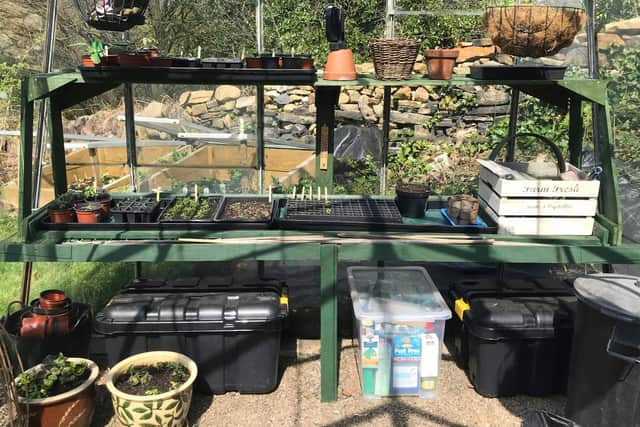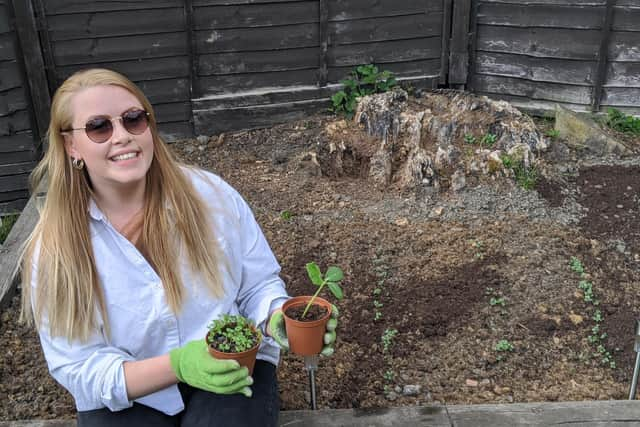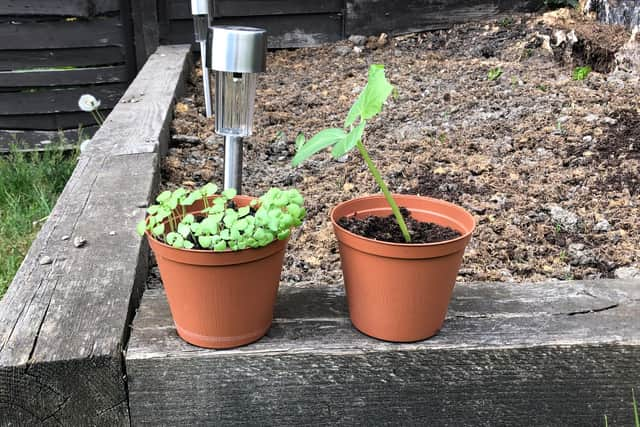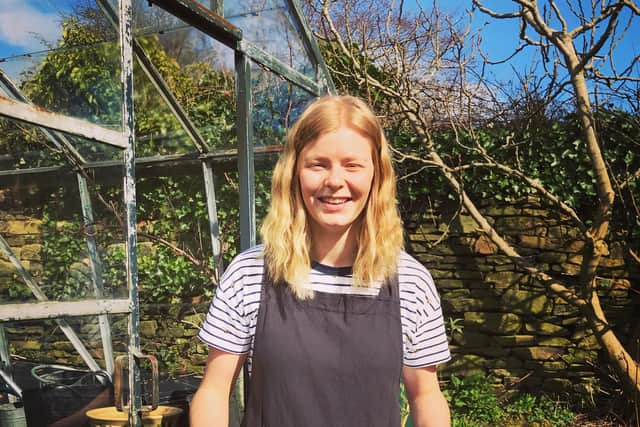How lockdown gardening is helping Yorkshire through crisis
Like anyone who’s had the experience of supermarket shopping under lockdown, 24 year-old Hannah Bright has come face-to-face with empty shelves several times since the pandemic began.
The most in-demand products are often random and vary from shop to shop. At Hannah’s local in Leeds, it’s fresh basil that’s been missing for “three or four weeks”.
Advertisement
Hide AdAdvertisement
Hide AdThanks to Hannah’s first-time foray into lockdown gardening, however, she’s now able to harvest her own basil - and various other herbs - without leaving the house at all.


With garden centres and nurseries across Yorkshire reporting a “huge spike” in sales of grow-at-home fruit and veg seeds since lockdown began, she’s one of thousands across the county - and beyond - who have recently taken to growing their own.
And while seasoned gardeners are certainly relishing the opportunity to tend to their micro crops while stuck at home, an uptick in Google searches for “amateur gardening” and “square foot gardening” indicates that those with no experience, little experience and limited space are coming to gardening for the very first time.
The most obvious reason for this gardening boom is, of course, the free time that’s been bestowed - whether willingly or not - upon millions of workers who have been laid off, furloughed or shifted to full time home-working.
Advertisement
Hide AdAdvertisement
Hide AdHannah, who works full-time in PR, admits that in ordinary circumstances, she wouldn’t have had the time to set up her new veg patch - which includes parsnips, broccoli, cucumber, chives, dill, and basil:


“When you add on commuting time, and having the weekend being busy with going out and doing stuff...I just don’t think I would have been able to dedicate the time to doing it. [When working from home] I can just spend fifteen minutes on my lunch break pottering about in the garden doing bits and bobs that I wouldn’t be able to normally”.
What’s more, tending to a garden or allotment is one of few permitted reasons for spending time outdoors during lockdown - with figures from several allotment sites across Yorkshire revealing a spike in plot requests since restrictions came into place.
In Bradford, Allotments Officer Janette Goodinson says the increase in requests has been “incredible”, with the 104 applications made in April 2020 dwarfing the 41 made during the same period last year.
Advertisement
Hide AdAdvertisement
Hide AdCllr Susan Press of Calderdale Council - where allotment requests saw a five-year high in March and April - says that many applicants have cited mental health as their motivation for seeking a plot:


“A number of people applying to Calderdale Council for a plot in the past few weeks have mentioned mental wellbeing as a driver...Research has shown that allotments are not only good for our physical health as they get us moving more; they also play a significant role in boosting our mental health and wellbeing”.
For Sally Fairbrass, who runs an online gardening blog, it’s this element of gardening that’s become especially important under lockdown. Currently working as an ICU nurse in Yorkshire, the 26 year-old demonstrates why the rise in lockdown gardening is about more than just free time:
“I do find my garden a great stress relief...being outside and doing something with that future planning gives me a sense of purpose”.
Advertisement
Hide AdAdvertisement
Hide AdHannah echoes this sentiment, saying that she’s found gardening to be “a great way to take your mind off everything that’s going on”.


Planting and growing, it seems, is offering people a way of exerting a degree of control over a future that is mostly uncertain; “future planning” that doesn’t just focus on the negatives.
In some cases, lockdown has added an urgency to long standing plans to start gardening. It wasn’t just the supermarkets which saw a run on products in the early stages of lockdown, but online seed and plant stores too.
Rob Coates of Holmfirth, who recently started his own lockdown veg patch, is among those who ordered in a few weeks back. Though he says he’s “always liked the idea of being able to enjoy eating something that I’ve grown”, it was lockdown that pushed him to finally buy veg seedlings.
Advertisement
Hide AdAdvertisement
Hide Ad“In the circumstances”, he says, “growing my own vegetables seems like a good idea”, touching on another impulse that’s been quietly driving the enthusiasm for lockdown gardening: the desire for self-sufficiency.
Having grown so accustomed to the ability to access whatever food products we like, whenever we like, empty shelves have laid bare the fragility of our food supply for the first time in a generation. And while it wasn’t her main motivation for growing, Hannah admits that this realisation may have played into her decision to start gardening:
“The first time we went to the supermarket with social distancing measures in place...there was barely anything...And you just think, you don’t know how long this will last, and we really don’t know a huge amount about the supply chain and how you actually get the vegetables into the supermarket and then onto your plate”.
It’s comforting, she says, to know that what she has grown “will be recurring”, removing some of the anxiety over supermarket stock.
Advertisement
Hide AdAdvertisement
Hide AdSally, who has ambitions to “one day have a small-holding of my own” agrees that part of the thrill of growing food comes from the “element of being sustainable and self-reliant”.
While the stereotypical image of a gardener has long been white, elderly and middle class, she says that younger people are increasingly coming to gardening because of this self-sufficiency element:
“There are a lot of younger people interested in the environment and by extension where their food comes from and being responsible about their impact and choices”.
Kay Heywood, secretary of the Boroughbridge Allotment society, says this understanding of a “typical” allotment-holder or gardener has been false for some time, with “plot holders of all ages [and] nationalities” populating allotments today, whom she says are “definitely not” all middle class.
Advertisement
Hide AdAdvertisement
Hide AdThis demographic change and uptick in gardening may stick beyond the end of lockdown. Sally, Rob and Hannah, for instance, all have keen intentions to carry on gardening even once lockdown is over.
Sally has ambitions to become even more self-sufficient with her food supply in the future, saying that her garden is “the start of a lifelong process that hopefully will only become more elaborate”.
With the pandemic accelerating the already-growing flexibility of work-from home options, the future of work may continue to allow people of all ages - not just the retired - to spend enough time at home to allow for garden upkeep during breaks or in place of a commute.
It’s possible there may also be a push for more allotment space, given many don’t have access to their own garden space. In wartime Britain when the “Dig for Victory” campaign was in full swing, it’s reported that there were around 1,400,000 allotments in the UK, but that number has declined significantly in the years since.
Advertisement
Hide AdAdvertisement
Hide AdIn many places, demand for allotment space has been higher than the amount available for several years. With the population taking up growing en-masse, it’s possible that there could be a push towards expansion once lockdown is over.
Lindsay Mitchell, Secretary of Unity Grove Allotments in Harrogate, says it’s something she’d love to see in her area, given “allotments are community green spaces which can contribute to population and individual health and wellbeing as well as community cohesion”.
Sally agrees that - under lockdown especially - growing fruit and veg has a community feel, or as she describes it, a “war-time, victory garden feeling that if you can grow your own and stay at home all the better for the social distancing movement”.
Given the mental and physical benefits, she says she’d encourage everyone to give it a go to get them through lockdown, not worrying too much about rules and specifics:
Advertisement
Hide AdAdvertisement
Hide Ad“All rules are out the window for lockdown gardening, it can be hard to get hold of supplies so get creative and use what you have”.
Most importantly, she says, “just get out there and try, have fun, there's no such thing as failure, only valuable lessons learnt!”